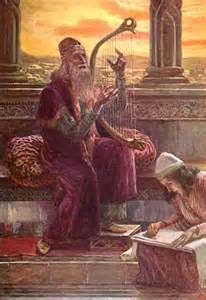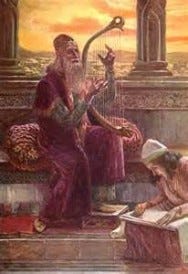The Theological History of the Old Testament


When explaining a redemptive-historical approach to Scripture to those who’ve never been exposed to a “theological” or “typological” hermeneutic, I tend to spend most of my time emphasizing the Old Testament’s use of itself, leaving questions of the New Testament’s use of the Old for a later day. There are several reasons for this, ranging from pragmatic (people tend to be less familiar with specific OT passages, and are thus more open to new readings), to temperamental (I personally have more fun in OT discussions than NT bull sessions), to pedagogical. In regards to what I perceive to be legitimate pedagogical reasons, there are at least three:
Firstly, I want people to be trained at the same hermeneutical boot-camp that the apostles attended. Peter and Paul were not “making it up as they went!” Rather, they were implementing the tools and skills which they learned from Jeremiah and Isaiah. To be sure, the apostles had new revelation which significantly changed the “things” they saw, but they were “seeing” in a way congruent with preceding revelation. In other words, the flow of the Bible is set in Genesis; the rest of Scripture goes with that flow, even while adding greater specificity and nuance to the nature of God’s redemptive plan. If people are firmly grounded in the way, say, Micah interprets early revelation; they won’t be as scandalized by the way in which John references the OT. Furthermore, they will feel free and equipped to read the Scriptures in an apostolic way. Said negatively, they won’t feel as free or equipped to utilize a hermeneutic alien to the Scriptures.
Secondly, I want people to draw richer, more textured typological connections. Often, a theological reading of Scripture will only connect a given type with either (1) Eden/Adam, (2) Jesus, or (3) the Eschaton. Certainly, Protology, Christology, and Eschatology are the widest doors through which to enter the typological world of Scripture, but they’re far from the only access-points. For example, as the quote below will point out, David is not only a “new Adam” and a pre-prefigurement of Christ, he’s also a “new Moses,” just as the temple is not only a “new creation” but also a “new tabernacle and alter.” If you go straight to questions of the NT’s use of the OT, you’re likely to miss the canonical-complexity of a given type. However, if you’re familiar with the types drawn in the OT, you’ll see that the shadow of your substance also has a shadow; once both shadows are considered the substance becomes all the more substantive!
Lastly, I want people to see that the God of history is a poet, and the God of poetry is historic. This point is most easily shown through the creation account. Evangelical Interpreters generally line up on the side of “theological/literary” or “historical.” Theological folk tend to insist that the literary connections they see between the creation of the world and the temple, or other Ancient Near Eastern literature, make any historical claim about God’s creative act invalid. Meanwhile, the historical folk are so busy asking the questions proposed by science and archeology that they never get around to asking literary questions of the literature.
The solution must not lie in a total rejection of both parties. Rather, the solution lies in a rejection of the bifurcation fallacy imbedded in the presuppositions of both arguments. The very historicity of the creation account is theological, just as its theological implications are historical. Once one begins reading the historical books of the Old Testament with eyes to see the typological connections throughout, one finds the insularity of the “historical” and “theological” parties intolerable. The historical accounts recorded in Scripture invite the reader to make literary connections we typically associate with literary theory. Why? Because history isn’t a random series of events. No, history is a beautiful, epic comedy being told by the great Poet-Redeemer.
Perhaps the easiest OT book in which to see these typological connections is Jonah, which I’ve written on here. However, what Jonah has in ease, Chronicles has in rich-complexity! What the Chronicler is doing, which could be called “theological history,” is the hermeneutical heartbeat of Scripture. While I’m uneasy with some of Scott Hahn’s arguments in his self-described “Theological Commentary” on 1-2 Chronicles, I do think he does a generally good job of situating the Chronicler in his canonical context. What Hahn says below about Chronicles is equally applicable to most of the Old Testament. Indeed, if one spends adequate time considering the story, structure, and hermeneutic of the OT, the NT can be read for what it is: the climax of Israel’s history. Says Hahn of the Chronicler:
“Like any good historian, the Chronicler provides a record of past figures, places, and events; but his accounting is written in such a way that these figures, places, and events often appear as types—signs, patterns, and precursors—intended to show his readers not only the past but also their present reality from God’s perspective. David is sketched as both a new Adam and a new Moses; the temple is a new creation and a new tabernacle and alter. In the Chronicler’s account, the faithlessness and failures of Israel’s first king, Saul, are replayed by kings centuries later. Saul is more than a failed monarch: he becomes the type of the unrighteous king who leads God’s people to ruin and exile. In the same way, good kings in Chronicles do the things that David did—because David is a prototype of the righteous king.
Acknowledging this intensely inner-biblical and typological narrative technique is not to deny the historical reliability of the Chronicler’s account. Rather, I am suggesting that reporting history ‘as it happened’ is not the Chronicler’s sole interest. What happened in the past is crucial for the Chronicler, but only because in the what of history he sees the patterns of divine intention and intervention revealed—the why of history. The why of history is the reason for the Chronicler’s work, which seeks not only to document past events but also to interpret these events in light of his readers’ present needs for guidance and hope in the face of an uncertain future.
The way the Chronicler comes to understand, interpret, and explain the why of salvation history is through typology. As an intensely typological work, Chronicles gives us a typological interpretation of history (Hahn 2005c: 19-25). Typology for the Chronicler is a way to shed light on the unity of God’s plan in history and to show the meaning of people, places, and events in light of God’s covenant promises and redemptive acts. “[i]
[i] Hahn, Scott. The Kingdom of God As Liturgical Empire: A Theological Commentary on 1-2 Chronicles. Grand Rapids, Mich: Baker Academic, 2012. Pg. 6-7.
The post The Theological History of the Old Testament appeared first on Kuyperian Commentary.

